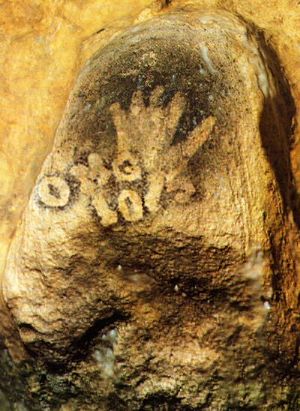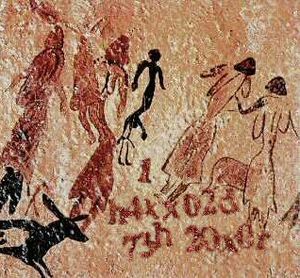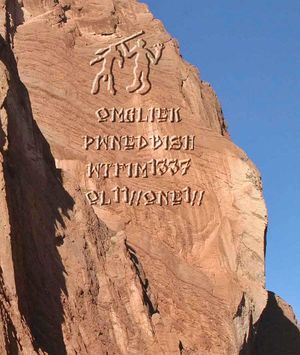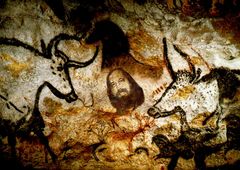4nc13n7 1337 14n9u493
7h3 4nc13n7 1337 14n9u493 (M0d3rn 1337: 4n(13n7 1337 14n9u493; Tiberian Leet 3yn(un7 1337 511n90) was the language of the Ancient Leet Civilisation. For much of the 20th century, its lexicon was a mystery to linguists across the globe. However, recent discoveries in the 4chan forum archives proved key in deciphering the code. Since then, historical linguists have had a field day exploring the evolution from Ancient Leet to Modern Leet, and the discovery has also been applied to the evolution of the Internet by ebaumsologists.
The Ancient Leet language is most notable to linguists because of its root form in comparison to more widely-used West Germanic languages — that is to say, they are very similar. Thusly, Ancient Leet could be described as a leech, were it not for the fact that its grammatical systems are irrevocably complex and incredibly hard to find a recurring pattern for (possibly because the Ancient Leetees were crappy writers). Nevertheless, many recently discovered writings have unlocked new words and sentence structures which, when linked together, can be used to create such exciting things as Ancient Leet sentences, despite there being no ordered system of verbs, nouns and adjectives.
Origins[edit | edit source]
Ancient Leet has its origins firmly grounded in Proto-Leet, the ancestor of n00b, itself a simple derivative of the Proto-English language. Although speakers of modern leet deny any such relation, linguists have found recurring and ever-changing patterns which link together Proto-English, n00b, Proto-Leet, Ancient Leet and modern Leet. There is, unfortunately, only one such example of Proto-Leet, from Le Havre, France:
| “ | ௱Ɠ ܛ ԾϢՈ Ư ЍϴΩβ! | ” |
The translation is uncertain, but, using Ancient Leet inscriptions, experts can tell that it should translate as "I cannot believe that I have defeated you, non-Leet!" Some have said that the phrase would be cried out following battle, possibly to scare any fleeing enemies, and several Professors at the Leet Evolutionary Tracking Organisation have backed this up. The inscription itself is pronounced "/omg ai ound ju: nu:b/", with the effect best achieved if imitating a diabetic thirty-year-old.
Some historians have found physical connections between the Proto-Leet and the Ancient Leet people, which helps solidify the theory that the latter evolved from the former. These findings also bring into play several theories about how the change occurred — a discarded can of Coca-Cola suggests that it happened not gradually but over a period of less than a year, in which the Leets fell foul of each other's soft drink preferences.
Table of Ancestry[edit | edit source]
Ancient Leet Script[edit | edit source]


Ancient Leet Script is known only by a few examples, mostly the many names of the god 411-90w3rfu1 3xp1371u3. The omnipresent "U1tr41337" is a key figure in understanding the social and religious structure of Ancient Leet society. Discovered in 1987 in a cave in the Netherlands, the first found scripture involving 90D described him as, according Oxford University's Leet Translation Department, a "benevolent, merciful and fVKN 4UUZM 133dR 101Z!" The last section has not yet been translated, although expert psychologists have analysed the sentence structure and guessed that the untranslated words are "...large genitaled over-lord!".
Various study of other assorted Ancient Leet scriptures have produced a wealth of data. One consistent factor seems to be that there is no consistent factor, rather just a jumble of symbols deviated from the English language. However, it is a recurring phenomenon in Ancient Leet Scripture that no grammatical rules seem to apply to Ancient Leet. It could be argued that the Ancient Leetees were too primitive to establish a cultural system of grammatical rules and errors, but then again, this civilization invented such complex Hoer-Bonning carticulae as your mom.
Letters[edit | edit source]
In the process of analyzing Ancient Leet Script, several symbols have been found as reappearing in the Leet writings. The Tablet of R493-157Z, which almost poetically describes the attack on a young Leet woman by a rival tribe and the Leet's swift revenge — "...they charged forward, worn by their journey, with fury in their eyes and jizz in their pants..." — features use of these identified symbols which is near identical to that of the English letter system. Although there is no present system of vowels and consonants, the current understanding of the twenty two Ancient Leetish "letters" is aptly comparable to English, as it was, of course, derived from it.
- 0 (O)
- 1 (I, L)
- 2 (Z)
- 3 (E)
- 4 (A)
- 5 (S)
- 6 (G)
- 7 (T)
- 8 (B)
- 9 (G, P)
- Π (Pie)
- C (C)
- D (D)
- F (F)
- H (H)
- J (J)
- K (K)
- M (M)
- N (N)
- Q (Q)
- R (R)
- U (U, V (also UU, W))
- Y (Y)
Vocabulary[edit | edit source]

Here is the known list of Ancient Leet words, with origins from Proto-Leet (if there is one)
Nouns / Pronouns[edit | edit source]
- U (/ju:/), You (Proto-Leet u)
- I (/ai/), Me (Proto-Leet i)
- j00 (/ju:/), also you (Proto-Leet y00)
- N008 (/nu:b/), not Leet, an insult (Proto-Leet newb/n00b)
Verbs[edit | edit source]
- 9UUN (/po:n/), to defeat (Proto-Leet 0wn)
- 5TFU (/es ti ef ju:/), to shut up
- FU (/ef ju:/), to fuck ones self
Interjections[edit | edit source]
- 0M6 (/o em dzhi:/), I can't believe it (Proto-Leet omg)
- UU7F (/wot the fuk/), ??? (Proto-Leet wtf)
- 0 R1Y? (/o rili:/), I don't believe you
- Y4 R1Y! (/ja rili:/), Yes
- N0 UU41! (/nou wei/), like OMG
- !!1!!!one!!!!!eleven!! (/won-won i:levun/), Shows excitement (Proto-Leet !!1!)
Adjectives / Adverbs[edit | edit source]
- 1337 (/liːt/), perfect (Proto-Leet leet)
- 31337 (/iliːt/), even better than 1337 (Proto-Leet eleet)
Roots[edit | edit source]
- 1 (/l/), to laugh, as in R0F1 (/rɔfl/), Rolling, Laughing and 101 (/lol/), Laughing loudly (Proto-Leet 10l)
- -7 (/'t/), past tense, as in 9UUN7! (/poʊnt/), to be defeated
- 73H (/te/), the, also D4 (/da/), the latter possibly a loan from gangsta rap (Proto-Leet teh)
More complex sentences[edit | edit source]
These are rough translations of Ancient Leet, still not fully deciphered.
“Ancient Leet”
– 31337 on 914C3
“Modern English”
– Elite on Place
Greetings[edit | edit source]
“9UUNT!”
– 31337 on 73H UU411 0F R0F101
“Good morning, defeated warrior.”
– Elite on The Wall of laughter
“FU!”
– 31337 on 73H 444444444!
“Please be rid of yourself, goodbye.”
– Elite on The AAAAAAAAA!
Other Sentences[edit | edit source]
“1 9UUN U N008!”
– 31337 on 14ND 0F 9UUN46E
“I defeat you, non-leet!”
– Elite on Land of Defeated armies
“57FU j00 N008, FU!”
– 31337 on 574N-MY5P4(3 80RD3R
“Be quiet, you are annoying.”
– Elite on The border of the elite and the idiots
The Mural of 0M9UU7F101R0F1MF40[edit | edit source]
R0F101! 0M9UU7F1MF40! | /
___() (:0)--|---
/| | \
____/ |
|
|
- Ancient Cave Paintings Of 1) A Man ROFL-LOLing in the cavrens of ancient Stan 2) An ancient All-Person Emoticon. The mural is supposedly called 0M9UU7F101R0F1MF40.
A person who studies the Ancient Leetians is known as a 'Leetologist'. Ancient Leet was first translated with the R053774 570n3 in 1337 AD.
533 4150[edit | edit source]
- English language
- Esperanto
- Klingon language
- French language
- German language
- Japan


